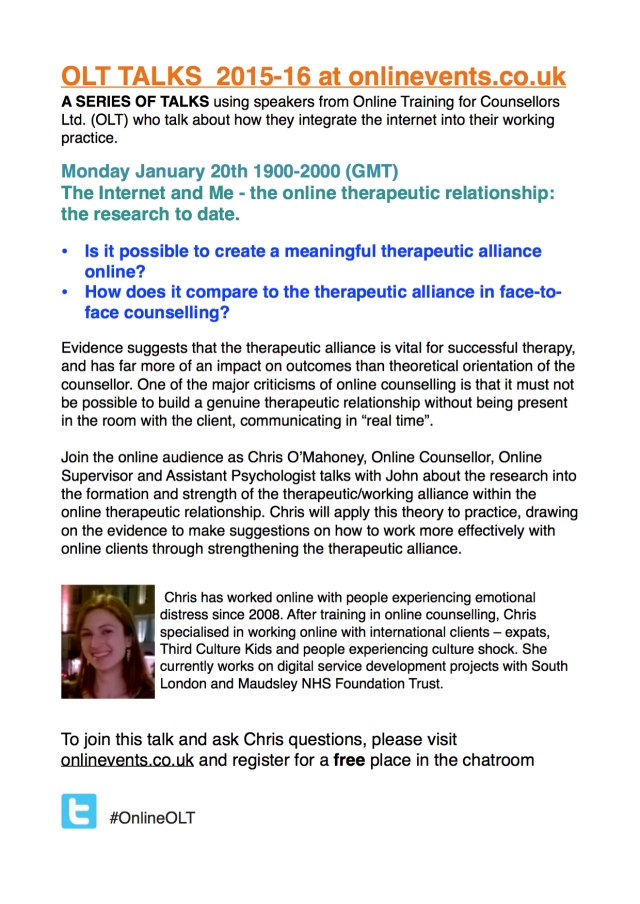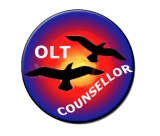Working Online from Home
Some of the challenges

This blog is addressed to all counsellors who use their computer to work from home whet
her they are meeting clients online or face to face. I began my counselling career working face to face first in an agency, then at home. Once I was working solely from home I found it difficult to feel that my working day had ended when the last client had left – there was no journey time between home and work to collect my thoughts and move from counselling life to home life. It helped to go upstairs and change out of my ‘work’ clothes into something casual but my counselling room held my piano and non-counselling books so the door wasn’t completely shut. In the early days of my 25 years in counselling I carried my clients with me day and night – in my head. I found myself thinking about them at all sorts of odd times. Gradually experience taught me that whilst it was important to think about and process the work I was doing, I could do this in my client notes, then mentally switch off that client until I saw them again when their presence in the room (and my notes) helped me recall the work we had done and were engaged in.
When I began working online in 2001 something else happened and I found it difficult to recall my clients. I had to re-read everything we had both written before writing my reply. This quickly turned an email reply to a client into a major reading project which lasted well over the allotted hour. So, even though there was a complete transcript of the work, I began making notes after each email much as I had done with face to face clients. This helped me recall the clients from my notes and continue the work without re-reading everything that we had written before. But working online from home brought other challenges – I found myself being available online to clients more or less 18 hours a day, 7 days a week and I never seemed to know when the day’s work was finished.
Have you done any of the following?
- Ended your day at the usual time only to check for client emails later in the evening because you were online again (shopping, or gaming, or skyping relatives in Australia)?
- Noticed a new email enquiry in your Inbox at 11 pm and decided to have a quick look and write a reply there and then? [thinking it would save time in the morning]
- Suddenly realised you had forgotten to add something to your online supermarket order and shelved the client email you were working on to add it whilst you remembered? [giving yourself more work when you went back to the client email, re-reading what you had worked on so far]
- Worked on a client email on a Saturday or Sunday even though your website clearly states that you work Monday – Friday? [to save time again]
- Checked for emails on a Sunday evening to clear the spam out of the way ready for Monday morning and found yourself reading a client email? And even if you decided not to answer it then, you kept thinking about it?
I’ve done all these but I’ve become stricter with myself recently. I set boundaries with email clients
– they know on which day of the week our ‘session’ is (when I will be working on their emails). Live session clients respect that I may be working with another client if they see I am online between sessions and use an email for their ‘quick word’ which I will acknowledge and keep until our next scheduled session.
If I find myself tempted to break these ‘rules’ I challenge myself “face to face clients couldn’t contact me between sessions other than put a message on the office answerphone; why should I treat online clients any differently?
Why set boundaries? – my beliefs
- I believe that clear boundary setting and holding is important both for me and my online clients.
- I believe they need time to process what’s happening in the work with me and if I respond earlier than agreed I am not allowing time for this to happen.
- I believe I offer them better therapeutic help if I know when I am working with them and when I am not.
- I believe that being available 18/7 to clients turns me into a relentless treadmill and stops me being the best online counsellor I can.
I realise this is my personal way of working and won’t suit everybody – particularly if you are working online with clients in crisis. (I negotiate a time-limited different level of contact with a client who finds themselves in crisis whilst working with me.)
What does help?
Have these boundaries solved the problem of switching off from online work? Not completely, if I’m honest. It’s still hard to ignore an email alert that arrives whilst I’m online. Email enquiries generally, galvanise me into replying that day if I possibly can. Curiously, emails from friends and family sit around in my Inbox for days!
What also helps is to have as much separation as possible between my online work and leisure activities. Not only do I have separate email programs for work and friends and separate programs (platforms) for webcam or text sessions with clients and friends, I also have a laptop for work, and a tablet for out of work, internet activities. Nowadays I can more or less let go of work each day, leaving it safely inside the laptop and use my tablet for my internet leisure activities.


If you have found a way to switch off from work each day, please share it here. Gill Jones


 s ago when it was in its early days and was delighted to make contact with two of its current staff on this visit. It was good to know that they are still in existence. One of the ‘hot topics’ we discussed concerned the issues which arise when working with young people online, whether offering support or counselling.
s ago when it was in its early days and was delighted to make contact with two of its current staff on this visit. It was good to know that they are still in existence. One of the ‘hot topics’ we discussed concerned the issues which arise when working with young people online, whether offering support or counselling.

 she wished to explore. In her mail however she explained that she worked abroad for many months of the year and would consider continuing via online counselling. We had three F2F sessions, a fortnight apart and then a week apart, and established a useful working alliance. At this point my client was returning overseas and we agreed that she would contact me once settled into her role abroad.
she wished to explore. In her mail however she explained that she worked abroad for many months of the year and would consider continuing via online counselling. We had three F2F sessions, a fortnight apart and then a week apart, and established a useful working alliance. At this point my client was returning overseas and we agreed that she would contact me once settled into her role abroad.



 is will be the third in our series “The internet and me” in collaboration with
is will be the third in our series “The internet and me” in collaboration with